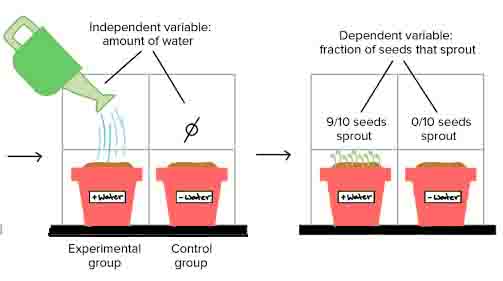Experimental Group Definition
In a comparative experiment, the experimental group (aka the treatment group) is the group being tested for a reaction to a change in the variable. There may be experimental groups in a study, each testing a different level or amount of the variable.
The other type of group, the control group, can show the effects of the variable by having a set amount, or none, of the variable. The experimental groups vary in the level of variable they are exposed to, which shows the effects of various levels of a variable on similar organisms.
In biological experiments, the subjects being studied are often living organisms. In such cases, it is desirable that all the subjects be closely related, in order to reduce the amount of genetic variation present in the experiment. The complicated interactions between genetics and the environment can cause very peculiar results when exposed to the same variable.
If the organisms being tested are not related, the results could be the effects of the genetics and not the variable. This is why new human drugs must be rigorously tested in a variety of animals before they can be tested on humans. These different experimental groups allow researchers to see the effects of their drug on different genetics.
By using animals that are closer and closer in their relation to humans, eventually human trials can take place without severe risks for the first people to try the drug.
Examples of Experimental Group
A Simple Experiment
A student is conducting an experiment on the effects music has on growing plants. The student wants to know if music can help plants grow and, if so, which type of music the plants prefer. The students divide a group of plants in to two main groups, the control group and the experimental group.
The control group will be kept in a room with no music, while the experimental group will be further divided into smaller experimental groups. Each of the experimental groups is placed in a separate room, with a different type of music.
Ideally, each room would have many plants in it, and all the plants used in the experiment would be clones of the same plant. Even more ideally, the plant would breed true, or would be homozygous for all genes. This would introduce the smallest amount of genetic variation into the experiment.
By limiting all other variables, such as the temperature and humidity, the experiment can determine with validity that the effects produced in each room are attributable to the music, and nothing else.
Bugs in the River
To study the effects of variable on many organisms at once, scientist sometimes study ecosystems as a whole. The productivity of these ecosystems is often determined by the amount of oxygen they produce, which is an indication of how much algae is present.
Ecologists sometimes study the interactions of organisms on these environments by excluding or adding organisms to an experimental group of ecosystems, and test the effects of their variable against ecosystems with no tampering. This method can sometimes show the drastic effects that various organisms have on an ecosystem.
Many experiments of this kind take place, and a common theme is to separate a single ecosystem into parts, with artificial divisions. Thus, a river could be separated by netting it into areas with and without bugs. The area with no nets allows bugs into the water. The bugs not only eat algae, but die and provide nutrients for the algae to grow.
Without the bugs, various effects can be seen on the experimental portion of the river, covered by netting. The levels of oxygen in the water in each system can be measured, as well as other indicators of water quality. By comparing these groups, ecologists can begin to discern the complex relationships between populations of organisms in the environment.
Related Biology Terms
- Control Group – The group that remains unchanged during the experiment, to provide comparison.
- Scientific Method – The process scientists use to obtain valid, repeatable results.
- Comparative Experiment – An experiment in which two groups, the control and experiment groups, are compared.
- Validity – A measure of whether an experiment was caused by the changes in the variable, or simply the forces of chance.

